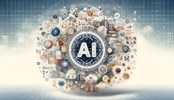Workers benefit from automation and AI – if they can influence the process
Automation and artificial intelligence will have profound effects on the labor market. In some cases, jobs can be completely replaced by machines and digital systems. But in most cases, we will see changes in tasks and processes.
A key driving force is the technology’s potential to increase productivity and competitiveness, as recently noted by the Swedish government's AI commission. How can this happen in a way that benefits both workers and firms?
In a new doctoral thesis from the Stockholm School of Economics, German Bender shows that the answer lies in listening to the workers.
“Employees must be involved early in the process, and they must have the opportunity to actually influence it. In Sweden, labor unions have the right to negotiate about new technology like AI and automation. In many cases, they can prevent or slow down processes that are harmful to employees,” says German Bender.
Strong unions are an advantage when AI is introduced
In the study, German Bender and his co-author Fredrik Söderqvist interviewed union representatives and management representatives in the mining company Boliden AB, which has an innovative automation program. The researchers also examined internal documents such as collective agreements, company-specific rules, and technical specifications, as well as legislation and government ordinances.
Using Power Resource Theory, developed by the Swedish sociologist Walter Korpi, the study finds that the Swedish labor market is regulated in a way that gives significant power resources to trade unions, especially in well-organized sectors like the industry. The case study shows how unions with considerable power resources can influence the implementation of automation and AI to the benefit of both the workers and the mining company.
“This is a big difference compared to industries or countries with weaker trade unions and regulations that unilaterally favor employers. In those cases, digital automation is more likely to result in surveillance, micromanagement, lower wage growth and job losses without the opportunity of appropriate skills development or income protection,” says German Bender.
Increases productivity and competitiveness
A concrete example in the study is how the mining company and its unions agreed to introduce a digital positioning system to increase safety in the mine, on the condition that the system anonymizes individual miners and that the data will not be used for other purposes (such as surveillance or performance measurement). Another example is how exemptions from working time regulations were negotiated in local collective agreements, to allow for the implementation of semi-autonomous vehicles during nighttime.
These solutions help Boliden increase its productivity and competitiveness, while also improving safety and allowing employees to influence how and for what purposes the technology is used.
The study shows how AI and automation can be implemented to the advantage of both workers and firms, and also explains why the effects of these technologies often differ between countries and industries.
In addition to this case study, the dissertation includes three other papers on wage formation and migration. The summary chapter can be downloaded via the Stockholm School of Economics research hub. The full dissertation can be requested from researcher.
For more information, please contact:
German Bender
Affilierad forskare
Tel: 0702-023 111
Email: german.bender@hhs.se

